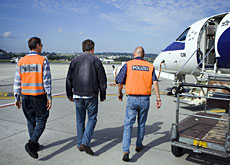
Swiss criticised over extraditions to Turkey

Human rights campaigners and legal experts have accused Switzerland of flouting international law over plans to extradite suspected Kurdish terrorists to Turkey.
They say the government’s decision to rely on “diplomatic assurances” from Turkey that suspects will not be ill-treated or tortured raises serious concerns.
The Swiss foreign ministry says several extradition cases are pending before the authorities and courts involving people accused of serious crimes or acts of terrorism.
It says each case will be carefully assessed and, if required, “legally-binding” guarantees sought from Turkey that suspects will not face torture or ill-treatment. These could include the right for Swiss representatives to take part in proceedings and to visit individuals.
“Extradition would not be permitted if there is a specific risk that an imperative norm of international law such as the ban on torture… could be violated,” foreign ministry spokesman Lars Knuchel told swissinfo.
But the move has been roundly condemned by Human Rights Watch, which says serious abuses continue in Turkey, notably against Kurds with links to banned organisations such as the separatist Kurdistan Workers Party or PKK .
The global human rights watchdog says the risk of torture and ill-treatment of terrorism suspects remains a major concern, despite Turkey’s reform process – a view shared by the Geneva-based International Commission of Jurists (ICJ).
Human Rights Watch claims that extraditing the suspects to Turkey would breach the United Nations Convention Against Torture and the European Convention on Human Rights.
The UN torture treaty, which Switzerland ratified in 1986, states clearly that signatories should not expel, return (“refouler”) or extradite a person to another state where they run the risk of torture.
Difference of opinion
But the Swiss government insists that a distinction be made between cases of return – such as those involving rejected asylum seekers – and extradition.
“Switzerland is of the opinion that diplomatic assurances are an appropriate instrument only in cases of extradition, because the requesting state has a crucial interest in respecting such assurances,” said Knuchel.
This argument has been given short shrift by the ICJ, which fears the Swiss are setting a “dangerous precedent” for other European countries.
“The legal principle of ‘non-refoulement’ – that you cannot send someone back to a country where there is a risk of torture or ill-treatment – is established jurisprudence and applies to all transfers and to extradition as well,” said Gerald Staberock, director of the ICJ’s counter-terrorism programme.
Guarantees
Human Rights Watch and the ICJ also argue that by seeking guarantees from Turkey, the Swiss are in effect acknowledging that there is a real risk of torture and ill treatment.
“If Turkey’s reforms had progressed to such a degree that it was in full compliance with its obligations as a member of the Council of Europe, including respect for the prohibition of torture, then diplomatic assurances against torture and ill-treatment would be unnecessary,” Human Rights Watch wrote in a letter to Swiss President Micheline Calmy-Rey.
The pressure group adds that there have been a number of cases where courts in Canada, Germany, the Netherlands and Britain have stayed or halted extraditions because diplomatic assurances were found to be unreliable and insufficient.
The Swiss authorities, however, claim to have no knowledge of any case in which torture has been proven after an extradition accompanied by guarantees.
swissinfo, Adam Beaumont in Geneva

More
President of the Confederation
An independent panel of legal experts, which is investigating the global impact of counter-terrorism measures, declared earlier this month that it was “unacceptable” to deport persons to states that use torture on the basis of diplomatic assurances, saying they were unenforceable.
The Eminent Jurists Panel on Terrorism, Counter-terrorism and Human Rights, which has received funding from Switzerland, includes Swiss judge Stefan Trechsel, a former president of the European Court of Human Rights.
Other members include Mary Robinson, the former UN High Commissioner for Human Rights, and Arthur Chaskalson, former chief justice of South Africa.
Swiss moves to extradite the suspects come at a time of increased anti-terrorism collaboration between Bern and Ankara.
In October last year Swiss Justice Minister Christoph Blocher held what were described as “extremely open” discussions in Turkey with his then counterpart Cemil Cicek on asylum and the fight against terrorism.
Blocher said at the time that Bern had already handed over one suspected terrorist, and three other Turkish citizens also accused of terrorism were being held in Switzerland pending extradition.
Blocher and Cicek met again in March for further talks on bilateral issues – this time in Bern.

In compliance with the JTI standards
More: SWI swissinfo.ch certified by the Journalism Trust Initiative































You can find an overview of ongoing debates with our journalists here . Please join us!
If you want to start a conversation about a topic raised in this article or want to report factual errors, email us at english@swissinfo.ch.